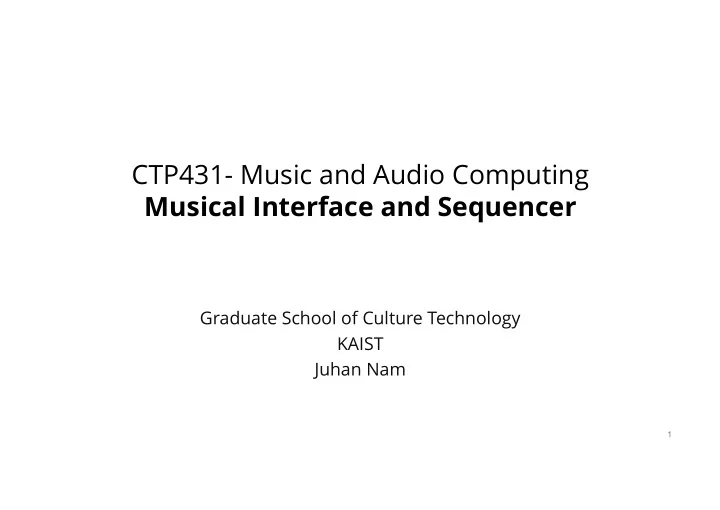

CTP431- Music and Audio Computing Musical Interface and Sequencer Graduate School of Culture Technology KAIST Juhan Nam 1
Musical Instrument § Performers interact with instruments in various ways – key striking, plucking, blowing, bowing – Expressions: continuous/discrete, dynamics, subtlety – Monophonic / polyphony – Learning curve, virtuosity, challenge/boredom for different musical instruments 2
Digital Musical Instrument (DMI) Tone Performer’s Musical Controller Sound Generator Gesture Events § In DMI, controller and tone generator are de-coupled – Controller: capture gesture data and convert them to musical events – Tone generator: synthesize musical tones 3
Musical Controllers AXiS-64 MIDI Keyboard https://www.youtube.com/watch?v=pQ4nPcGCGIs Pad Controller Haken Continuum https://www.youtube.com/watch?v=PnBhR8RLJN8 4
Musical Controllers Drum Controller Wind Controller Guitar Controller 5
Musical Controllers https://www.youtube.com/watch?v=44F0d2CbjM0
New Controllers Virtual Slide Guitar Radio Baton (by Max Mathews) https://www.youtube.com/watch?v=aIJ-8kd8rFs https://www.youtube.com/watch?v=3ZOzUVD4oLg 7
New Controllers Guthman Musical Instrument Competition: http://www.guthman.gatech.edu/ NIME (New Inferfaces for Music Expressions): http://www.nime.org/ Reactable https://www.youtube.com/watch?v=Mgy1S8qymx0 8
Inside the Controllers Micro Electrical Musical Gesture Sensor Controller Signals Protocol § Sensors – Button (or switch), potentiometer (knob), resistive (rubber, photo-resister), optical, accelerometer, gyro, microphone, camera… – Physical actions: push, rotation, velocity, pressure, location, … – http://www.sensorwiki.org/doku.php § Micro controllers – AD converter (continuous input), input port (discrete input) – Map the captured input to musical protocols: MIDI, Open Sound Control (OSC) 9
Musical Instrument Digital Interface (MIDI) § Standard protocol of musical events § Why MIDI? – Need of musical communication among different vendors’ instruments – Store music events (score or performance) for composers § Hardware – 5-pin cables, separate in/out in connection – 31250 bits per second § Software (Protocols) – Note number/velocity, control data 10
MIDI Message Status Byte Data Byte1 Data Byte2 Note Off 1000 xxxx Note Number Velocity Note On 1001 xxxx Note Number Velocity Note Pressure 1010 xxxx Note Number Velocity Control Change 1011 xxxx Ctrl. Number Ctrl Value Program Change 1100 xxxx Prog. Number - xxxx: channel number (0-15) Data byte: 0-127 (MSB is 0) 11
Sequencer § Music Box: the oldest sequencer? 12
Sequencer § Piano Roll (in player piano) Piano Roll 13
Step Sequencer Roland TR-808 Novation Launch Pad (Analog Sequencer + Drum Machine) https://www.youtube.com/watch?v=YeZZk2czG1c https://www.youtube.com/watch?v=gMgxLPcq-3o 14
MIDI Sequencer § Record, Edit and Playback MIDI Messages – Tempo (BPM) and time stamps are added – Time-stamped MIDI messages are stored as a MIDI file § MIDI Representations – MIDI Events – Piano Rolls – Music Notation (Music Score) § Most DAWs have MIDI sequencers – Sonar, Cubase, Logic, … 15
Web MIDI § Support MIDI on web browsers – W3C Editor’s draft: http://webaudio.github.io/web-midi-api/ § Step Sequencers – http://webaudiodemos.appspot.com/MIDIDrums/index.html – http://patternsketch.com/ – http://www.html5drummachine.com/ § Piano-Roll-type Sequencers – https://onlinesequencer.net/ 16
Recommend
More recommend